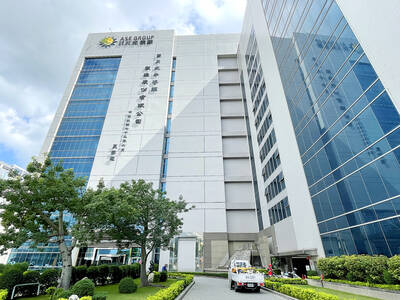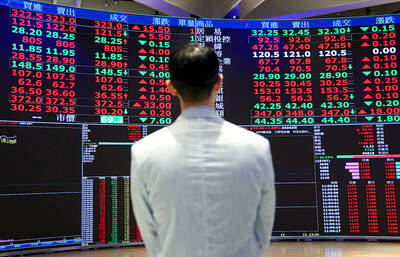The Financial Supervisory Commission (FSC) said yesterday it would consider allowing local financial firms to invest in China’s finance leasing companies.
Banking Bureau Director-General Kuei Hsien-nung (桂先農) made the announcement after a meeting between Financial Supervisory Chairman Chen Yuh-chang (陳裕璋) and executives from about 20 financial firms to discuss investment in China.
Kuei said the commission would place the issue on the agenda of its weekly committee meeting today.
If all proceeds smoothly, subsidiaries of local banks and financial holding firms may soon be allowed to make the move, Kuei said.
Financial Supervisory Commission Vice Chairman Wu Tang-chieh (吳當傑) said the commission would also consider easing other cross-strait banking rules and promote other changes that do not require legal revisions.
Local lenders have urged the government to allow them to open subsidiaries, instead of branches, in China, and to own a stake in more than a single Chinese peer.
Chairpersons from Chinatrust Financial Holding Co (中信金控), SinoPac Financial Holding Co (永豐金控), Shin Kong Financial Holding Co (新光金控) and Taiwan Industrial Bank (台灣工業銀行) said in a joint statement yesterday morning that they could not compete with their foreign counterparts in the Chinese market because of these restrictions.
A bank branch cannot conduct yuan trading or process loans of less than 1 million Chinese yuan (US$147,100), among other financial services that offer better profitability, the statement said.
“Various kinds of limitations severely weaken local lenders’ abilities to take advantage of China’s booming consumer market and other banking business opportunities,” the statement said.
It added that major foreign banks have, since 2006, set up subsidiaries in China and are aggressively strengthening their presence there.
Wu said that as this involves talks with China, the commission would conduct a detailed study when planning the next round of talks with Beijing.
The financial firms also urged the commission to raise China-bound banking investment ceilings, which are currently capped at 10 percent and 15 percent of the net worth of local financial holding companies and banks respectively.
The lenders did not recommend a new ceiling, Wu said.

EXPANSION: The investment came as ASE in July told investors it would accelerate capacity growth to mitigate supply issues, and would boost spending by 16 percent ASE Technology Holding Co (ASE, 日月光投控), the world’s biggest chip assembly and testing service provider, yesterday said it is investing NT$17.6 billion (US$578.6 million) to build a new advanced chip packaging facility in Kaohsiung to cope with fast-growing demand from artificial intelligence (AI), high-performance-computing (HPC) and automotive applications. The new fab, called K18B, is to commence operation in the first quarter of 2028, offering chip-on-wafer-on-substrate (CoWoS) chip packaging and final testing services, ASE said in a statement. The fab is to create 2,000 new jobs upon its completion, ASE said. A wide spectrum of system-level chip packaging technologies would be available at

Taiwan’s foreign exchange reserves hit a record high at the end of last month, surpassing the US$600 billion mark for the first time, the central bank said yesterday. Last month, the country’s foreign exchange reserves rose US$5.51 billion from a month earlier to reach US$602.94 billion due to an increase in returns from the central bank’s portfolio management, the movement of other foreign currencies in the portfolio against the US dollar and the bank’s efforts to smooth the volatility of the New Taiwan dollar. Department of Foreign Exchange Director-General Eugene Tsai (蔡炯民)said a rate cut cycle launched by the US Federal Reserve

HEAVYWEIGHT: The TAIEX ended up 382.67 points, with about 280 of those points contributed by TSMC shares alone, which rose 2.56 percent to close at NT$1,400 Shares in Taiwan broke records at the end of yesterday’s session after contract chipmaker Taiwan Semiconductor Manufacturing Co (TSMC, 台積電) hit a fresh closing-high amid enthusiasm toward artificial intelligence (AI) development, dealers said. The TAIEX ended up 382.67 points, or 1.45 percent, at the day’s high of 26,761.06. Turnover totaled NT$463.09 billion (US$15.22 billion). “The local main board has repeatedly hit new closing highs in the past few sessions as investors continued to embrace high hopes about AI applications, taking cues from a strong showing in shares of US-based AI chip designer Nvidia Corp,” Hua Nan Securities Co (華南永昌證券) analyst Kevin Su

Nvidia Corp’s major server production partner Hon Hai Precision Industry Co (鴻海精密) reported 10.99 percent year-on-year growth in quarterly sales, signaling healthy demand for artificial intelligence (AI) infrastructure. Revenue totaled NT$2.06 trillion (US$67.72 billion) in the last quarter, in line with analysts’ projections, a company statement said. On a quarterly basis, revenue was up 14.47 percent. Hon Hai’s businesses cover four primary product segments: cloud and networking, smart consumer electronics, computing, and components and other products. Last quarter, “cloud and networking products delivered strong growth, components and other products demonstrated significant growth, while smart consumer electronics and computing products slightly declined,” compared with the